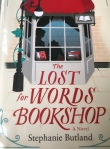 You know that feeling when you have a bug bite that has scabbed over and you pick at it and pick at it and make it bleed even though it is hurting and you know that you are making it hurt? That’s sort of the feeling I had while reading Stephanie Butland’s novel The Lost for Words Bookshop (St. Martin’s Press, 2017). I knew what I was reading was making me hurt but I kept reading and kept reading and kept reading, picking and bleeding along the way. In a good way. Really.
You know that feeling when you have a bug bite that has scabbed over and you pick at it and pick at it and make it bleed even though it is hurting and you know that you are making it hurt? That’s sort of the feeling I had while reading Stephanie Butland’s novel The Lost for Words Bookshop (St. Martin’s Press, 2017). I knew what I was reading was making me hurt but I kept reading and kept reading and kept reading, picking and bleeding along the way. In a good way. Really.
To be honest, I picked up this book off of the librarian’s choice shelf because of the cover, a bay window with a window seat and a bright red awning, and of course, the word bookshop was in the title. Right away, virtually from the first page, I was thinking about the voice of the protagonist, how it was edgy and young and “millennial” in nature. Curious about the author, about the person who created Loveday Cardew, I turned to the back flap of the book jacket…but no photo of the author there. Her short bio gave me no clue as to age so I googled her. I was shocked to see that she was not in fact a millennial, not someone who could be a contemporary of LJ, yet she had captured the essence of today’s 25-year-old, struggling with being an adult in a world that had been awfully cruel to her.
 I haven’t felt this way about discovering an author’s identity to be so different from the voice of her protagonist since the summer of 2012 when I read The Newlyweds (Knopf, 2012). I was so convinced (but oh so wrong) that author Nell Freudenberger had written the book under a pseudonym or under her married name as a woman, who like her protagonist Amina, had immigrated to America from Bangladesh. Fundamentally I understand that writers create worlds and imagine characters that they bring to the printed page with their literary talents, but I am not often left speechless by it being done in such a convincing way.
I haven’t felt this way about discovering an author’s identity to be so different from the voice of her protagonist since the summer of 2012 when I read The Newlyweds (Knopf, 2012). I was so convinced (but oh so wrong) that author Nell Freudenberger had written the book under a pseudonym or under her married name as a woman, who like her protagonist Amina, had immigrated to America from Bangladesh. Fundamentally I understand that writers create worlds and imagine characters that they bring to the printed page with their literary talents, but I am not often left speechless by it being done in such a convincing way.
I read a lot of mysteries, and I watch a lot of British dramas, but I always do so with one eye closed. I don’t really want to figure out what is going on too early, unlike my husband who usually has sussed it all up and become bored with it by the first commercial break. This book, though, this book was different. As the pages flipped by, and the alternating time frames (1999, 2013, and 2016) moved me about, I was trying to figure out what was going on. I even remarked to my younger daughter in a phone conversation, “something happened to this girl, something bad, she’s holding it back but it’s coming out I can tell, maybe she was raped”. (Note: not a spoiler, just what I had imagined that could be in her history.)
 I loved this book for many reasons. I loved that it grabbed my interest right away and never let me go, even when I was feeling pained by reading it. I loved the talk of books by people who loved books, who put such value in books. As a literature teacher and lifelong avid reader, that made me very happy. I loved how Butland unfolded the story of Loveday layer by layer, like peeling an onion or tearing away the rind of an orange slowly in one long, continuous, curling strip. I loved that there wasn’t an overload of characters for me to carry along in the story, just enough to make the story work, sort of like the number of words in a good poem, just enough to make it work. I loved that it was set in York, England, with constant talk of the sea, of Cornwall, of Devon, places I haven’t been to but long to see. I loved Butland’s use of imagery to paint a tapestry of scenes in my head, “The water was the blue of inkstained fingertips.” I loved LJ’s vulnerability and the way Butland colored her in, with an armor of tattoos and a mask of contempt for all that makes “normal” people happy and content. I loved how even in her state of absolute fear and confusion, Loveday still tried to excuse Rob because of his mental illness. I loved how Nathan thought he was broken, until he met someone he loved who was more broken than he could ever imagine. I loved how Butland left me speechless and sobbing at the end, how it made me miss my mom even more than I do every single day. But, one of the things I really loved about this book is that I stumbled upon a new author to obsess over.
I loved this book for many reasons. I loved that it grabbed my interest right away and never let me go, even when I was feeling pained by reading it. I loved the talk of books by people who loved books, who put such value in books. As a literature teacher and lifelong avid reader, that made me very happy. I loved how Butland unfolded the story of Loveday layer by layer, like peeling an onion or tearing away the rind of an orange slowly in one long, continuous, curling strip. I loved that there wasn’t an overload of characters for me to carry along in the story, just enough to make the story work, sort of like the number of words in a good poem, just enough to make it work. I loved that it was set in York, England, with constant talk of the sea, of Cornwall, of Devon, places I haven’t been to but long to see. I loved Butland’s use of imagery to paint a tapestry of scenes in my head, “The water was the blue of inkstained fingertips.” I loved LJ’s vulnerability and the way Butland colored her in, with an armor of tattoos and a mask of contempt for all that makes “normal” people happy and content. I loved how even in her state of absolute fear and confusion, Loveday still tried to excuse Rob because of his mental illness. I loved how Nathan thought he was broken, until he met someone he loved who was more broken than he could ever imagine. I loved how Butland left me speechless and sobbing at the end, how it made me miss my mom even more than I do every single day. But, one of the things I really loved about this book is that I stumbled upon a new author to obsess over.

Comment here!